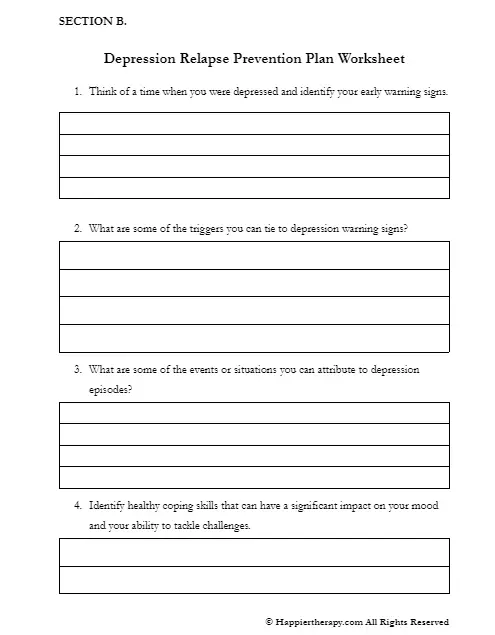When individuals are in recovery from addiction, it is important to have a plan in place to prevent relapse. One helpful tool in creating this plan is a relapse prevention plan worksheet. This worksheet can assist individuals in identifying triggers, developing coping strategies, and creating a support system to help maintain their sobriety.
Having a relapse prevention plan in place can significantly increase the chances of long-term recovery success. It allows individuals to be proactive in managing their triggers and cravings, rather than reacting impulsively in moments of weakness. By taking the time to complete a relapse prevention plan worksheet, individuals can better understand their vulnerabilities and develop strategies to overcome them.
Relapse Prevention Plan Worksheet
One important aspect of a relapse prevention plan worksheet is identifying triggers that may lead to relapse. These triggers can be internal, such as negative emotions or stress, or external, such as certain people or places. By recognizing these triggers, individuals can develop strategies to avoid or cope with them effectively.
In addition to identifying triggers, individuals can also use the worksheet to outline coping strategies for dealing with cravings and urges to use substances. This may include engaging in healthy activities, seeking support from a therapist or support group, or practicing relaxation techniques. Having a plan in place for how to respond to cravings can help individuals stay on track in their recovery journey.
Another important component of a relapse prevention plan worksheet is creating a support system. This may include family members, friends, therapists, or support groups who can provide encouragement and accountability. By surrounding themselves with a strong support network, individuals in recovery can feel more confident in their ability to maintain their sobriety.
By utilizing a relapse prevention plan worksheet, individuals in recovery can take proactive steps to prevent relapse and maintain their sobriety. This tool can help individuals identify triggers, develop coping strategies, and build a support system to assist them in their recovery journey. With a solid plan in place, individuals can increase their chances of long-term success in overcoming addiction.
In conclusion, a relapse prevention plan worksheet is a valuable tool for individuals in recovery from addiction. By taking the time to complete this worksheet, individuals can identify triggers, develop coping strategies, and create a strong support system to help prevent relapse. With a proactive approach to managing their recovery, individuals can increase their chances of maintaining their sobriety and living a healthier, fulfilling life.
